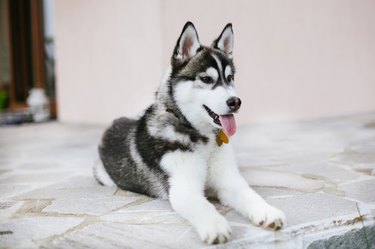
Lovable, strong, and energetic, huskies and other sled dogs were bred to pull loads over medium to long distances. Their plush coats and pointed ears give them a wolf-like appearance shared by several husky-like breeds. However, there are two types of dogs explicitly known as a husky — the Siberian husky and the Alaskan husky — with only the Siberian husky having official breed status.
Siberian husky breed
Video of the Day
Almond-shaped eyes are one of the distinct characteristics of the Siberian husky, according to the American Kennel Club, and those eyes can be blue, brown, or even one of each color. Those beautiful eyes can be prone to problems, though. The AKC recommends regular ophthalmologic evaluations to check for juvenile cataracts.
Video of the Day
Another attractive feature of the breed is that the Siberian husky doesn't have much in the way of "doggy odor," making them excellent companions who can accompany you on high-energy outdoor adventure and transition back to the car or house without much grooming fuss. Once-a-week brushings, a biannual bath, and raking their coat during shedding season is all this naturally clean breed needs, says the AKC.
Siberian huskies have a generally friendly nature which makes them get along well with their pack, but their friendliness also makes them poor watchdogs. Siberians need lots of exercise and love to romp and run but are prone to run off when not contained in a yard or on a leash. They're also very vocal, which can be detrimental when living in close quarters to neighbors, such as in an apartment or townhome.
Another husky — the Alaskan
The Alaskan husky isn't a recognized breed as it is usually a mixed breed dog according to husky breeders Hetta Huskies. Although Siberian huskies can range up to 60 pounds according to the AKC, the Alaskan huskies tend to be smaller and more compact.
The Alaskan husky usually doesn't have the plush coat found on a Siberian husky. They're generally suitable for short Arctic tours, but their more hound-like coat requires that they have shelter on cold nights where Siberian huskies are entirely at home sleeping outdoors in the snow.
Alaskans can run faster than Siberian huskies over short distances and excel at short sled-dog races rather than long-distance races where Siberian huskies excel.
Alaskan malamute and Samoyed
Although they're not formally called huskies, two other types of Arctic sled dogs share qualities with the Siberian and Alaskan huskies: the Alaskan malamute and Samoyed.
** Alaskan Malamute**
The Alaskan malamute is native to the 49th State and is significantly larger than the Siberian husky, weighing in at as much as 85 pounds. Heavy bones and muscles lie beneath a thick, dense coat which requires daily grooming. Like the Siberian, the Malamute sports almond-shaped eyes, except for always being brown in color.
While the Siberian husky is built to pull moderate loads at fast speeds, the Malamute is the freight-hauler of the dog world, able to pull one and a half times its weight at slow pace. The dog traditionally also carried heavy packs during the summer months, sniffed out seal breathing holes in the ice, and assisted in hunting bear.
*Samoyed *
Dazzling white balls of fluff, the Samoyed breed developed in Siberia where 60-degrees-below-zero Fahrenheit isn't uncommon. Initially bred for reindeer hunting and pulling heavy loads across the snow, Samoyeds eventually changed roles to herding reindeer for the Samoyede culture.
Like their Alaskan Malamute cousins, Samoyeds can pull one and a half times their weight and aren't designed to compete with the faster husky breeds. Their dense coat allows them to endure some of the coldest weather on earth, but they require daily brushing and shed their white hair constantly.